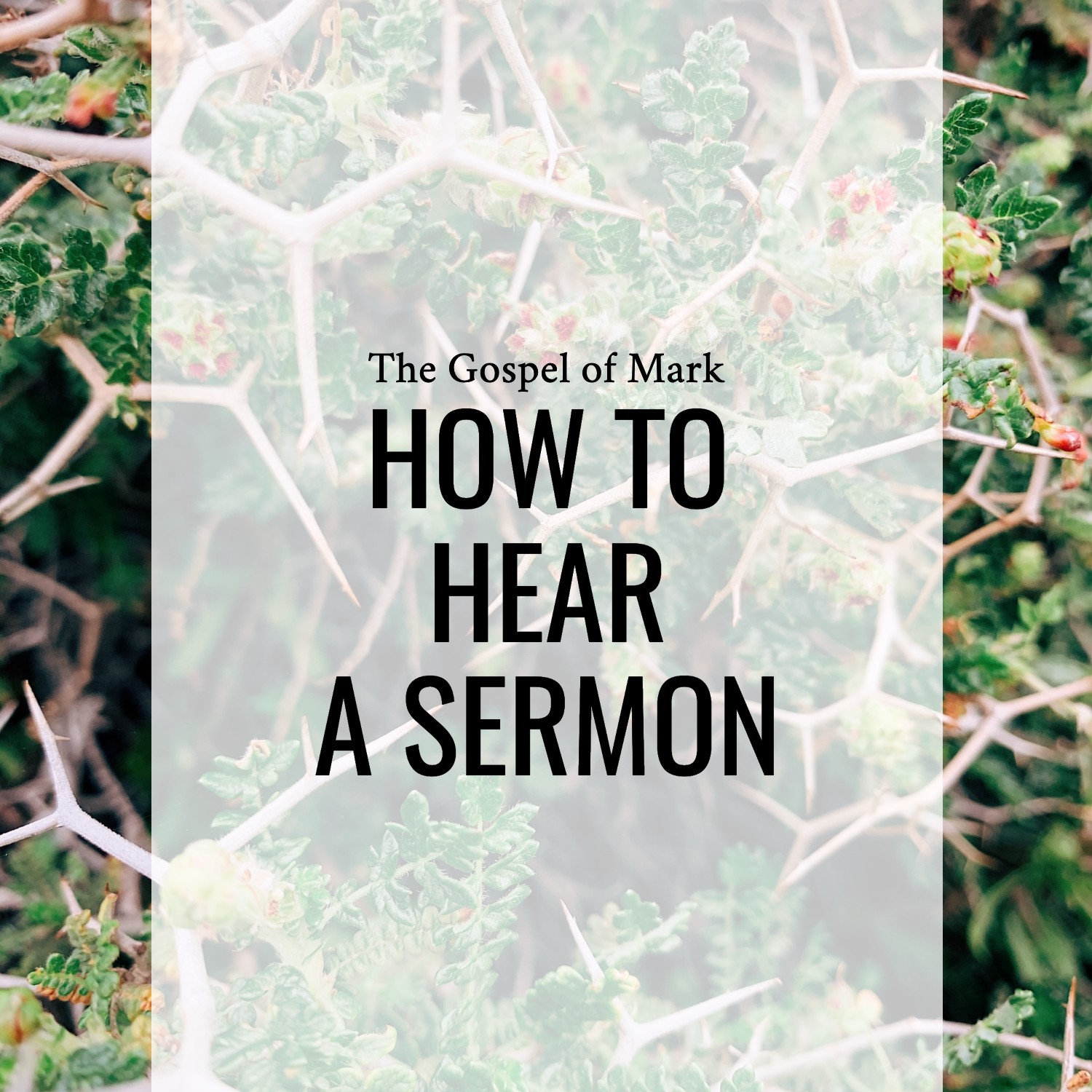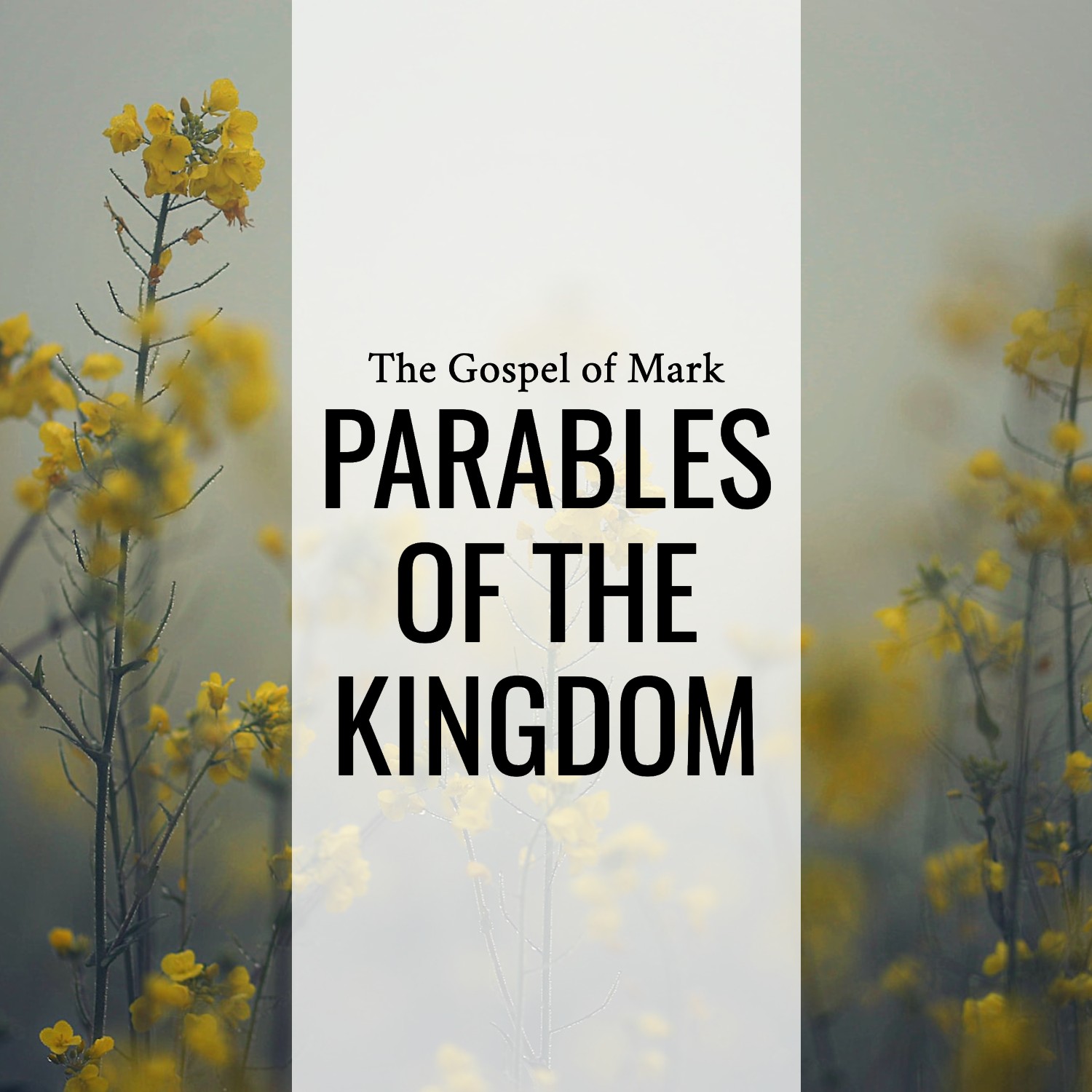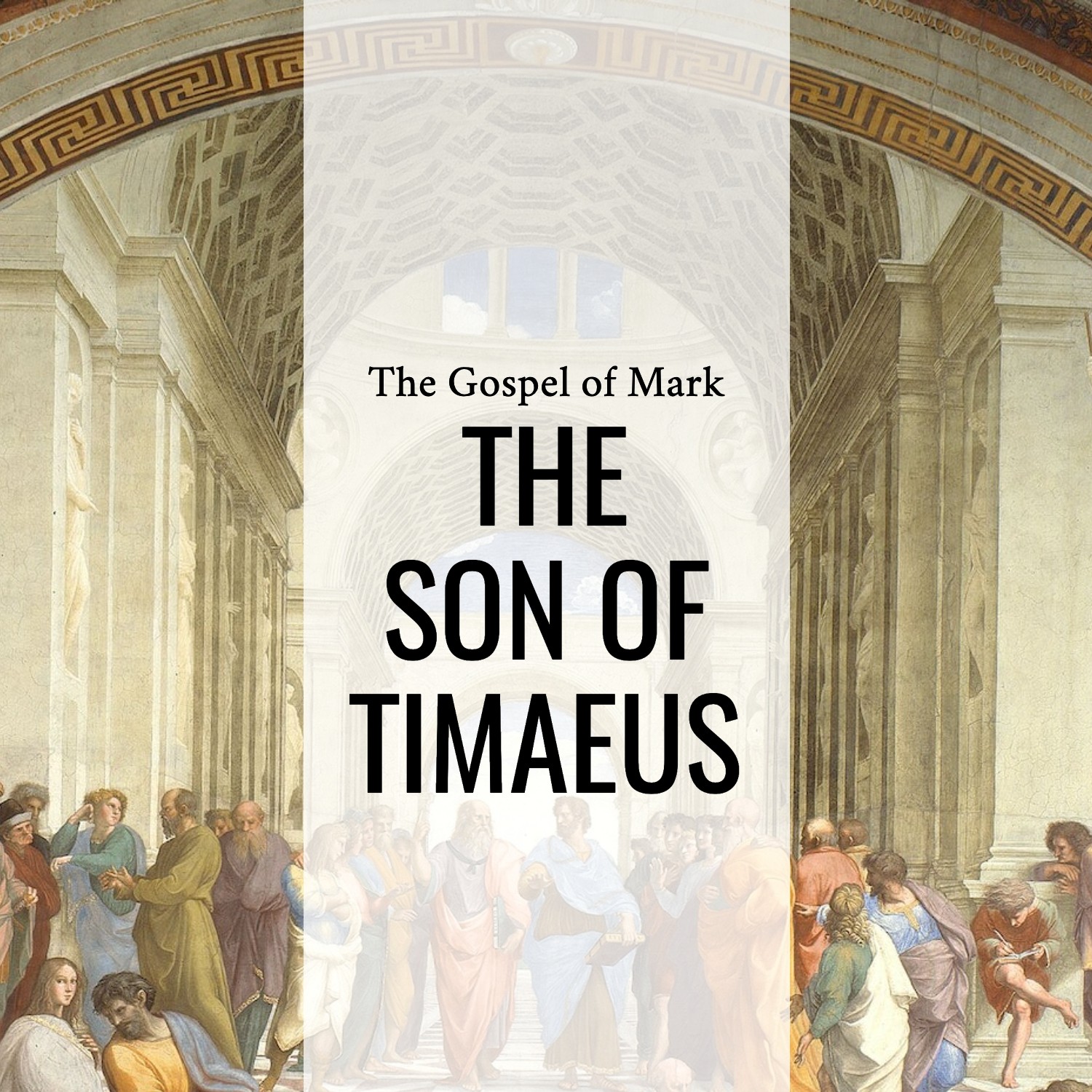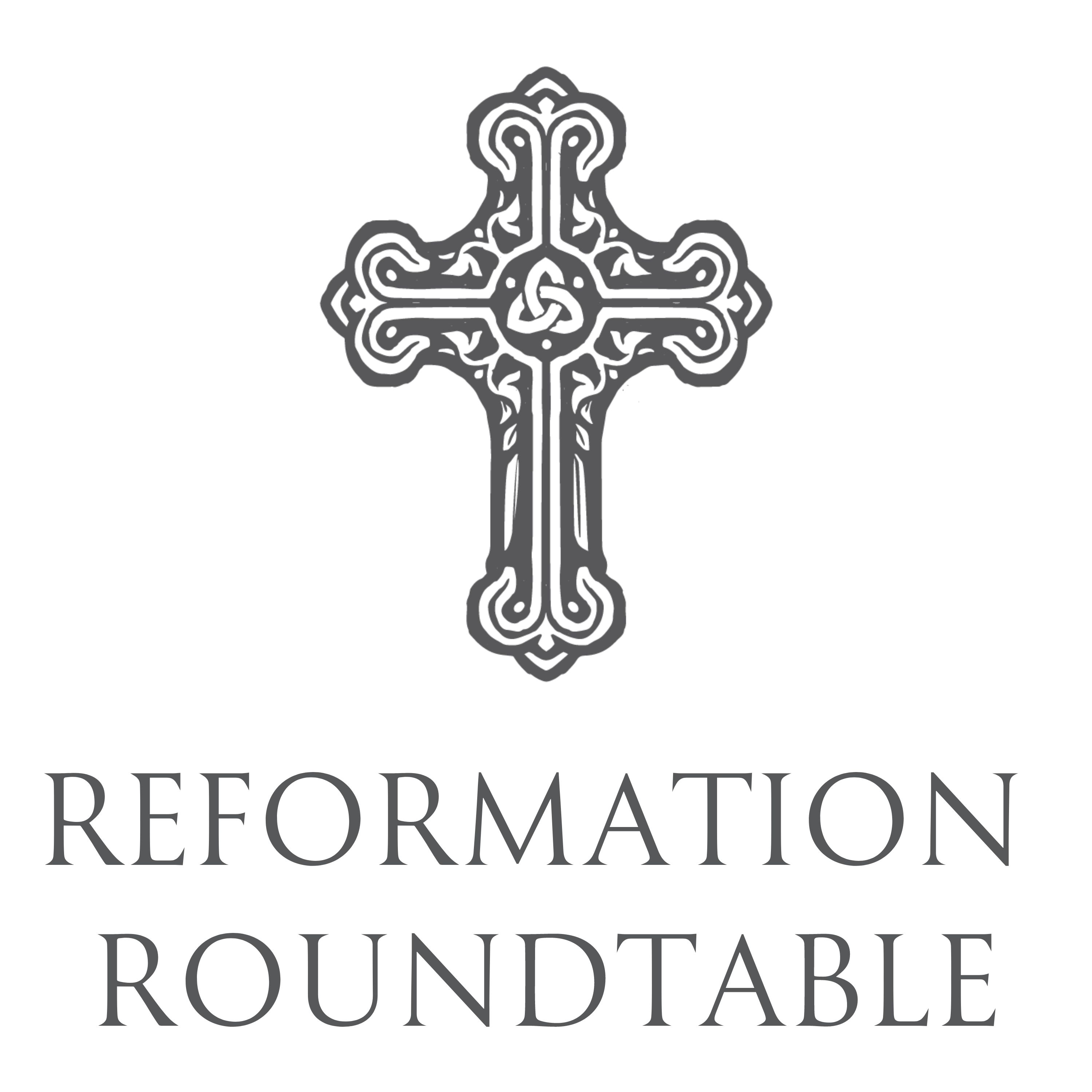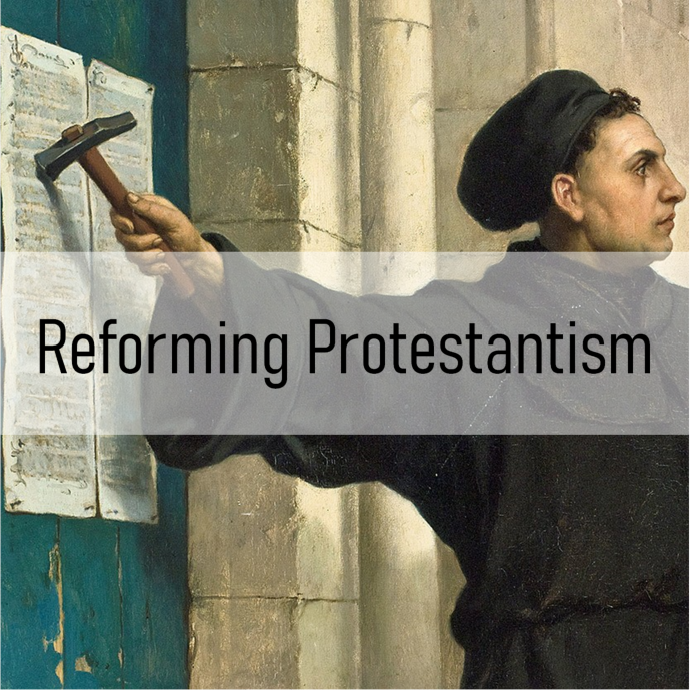Episode Transcript
How To Hear A Sermon
Sunday, June 11th, 2023
Christ Covenant Church – Centralia, WA
Mark 4:1-20
And he began again to teach by the sea side: and there was gathered unto him a great multitude, so that he entered into a ship, and sat in the sea; and the whole multitude was by the sea on the land. 2 And he taught them many things by parables, and said unto them in his doctrine, 3 Hearken; Behold, there went out a sower to sow: 4 And it came to pass, as he sowed, some fell by the way side, and the fowls of the air came and devoured it up. 5 And some fell on stony ground, where it had not much earth; and immediately it sprang up, because it had no depth of earth: 6 But when the sun was up, it was scorched; and because it had no root, it withered away. 7 And some fell among thorns, and the thorns grew up, and choked it, and it yielded no fruit. 8 And other fell on good ground, and did yield fruit that sprang up and increased; and brought forth, some thirty, and some sixty, and some an hundred. 9 And he said unto them, He that hath ears to hear, let him hear. 10 And when he was alone, they that were about him with the twelve asked of him the parable. 11 And he said unto them, Unto you it is given to know the mystery of the kingdom of God: but unto them that are without, all these things are done in parables: 12 That seeing they may see, and not perceive; and hearing they may hear, and not understand; lest at any time they should be converted, and their sins should be forgiven them. 13 And he said unto them, Know ye not this parable? and how then will ye know all parables? 14 The sower soweth the word. 15 And these are they by the way side, where the word is sown; but when they have heard, Satan cometh immediately, and taketh away the word that was sown in their hearts. 16 And these are they likewise which are sown on stony ground; who, when they have heard the word, immediately receive it with gladness; 17 And have no root in themselves, and so endure but for a time: afterward, when affliction or persecution ariseth for the word’s sake, immediately they are offended. 18 And these are they which are sown among thorns; such as hear the word, 19 And the cares of this world, and the deceitfulness of riches, and the lusts of other things entering in, choke the word, and it becometh unfruitful. 20 And these are they which are sown on good ground; such as hear the word, and receive it, and bring forth fruit, some thirtyfold, some sixty, and some an hundred.
Prayer
Father, we thank you for revealing unto us the mystery of the kingdom. We ask now that as we consider this parable from the Lord Jesus, that we might be given ears to hear, and eyes to behold your glory, and thus become fruitful. We ask for your Holy Spirit in Jesus name, Amen.
Introduction
How many sermons have you heard in the course of your life? How many sermons have you listened to?
If you have been a Christian for, say 10 years, and went to church every week, that’s about 520 sermons you have heard thus far. That’s quite a lot.
Now if you grew up in the church and are now in your 30s or 40s or 50s and beyond. You have no doubt heard many thousands of sermons by now.
Perhaps even over 100,000 sermons if you attended Sunday School, or mid-week or evening services, or listen to sermon podcasts, etc. That’s a lot of preaching over the years.
Now according to Jesus, each of those sermons was an opportunity for the “sowing of the word.” And the question Jesus sets before his audience is: How did you respond to that Word? What kind of fruit, if any, has come from all of that hearing? Did it do anything? What is different in your life because you heard those sermons?
Well, you see our text this morning is a sermon on how to hear a sermon. And this is the first extended block of teaching that we encounter in Mark’s gospel. This parable Jesus tells and then the explanation of it, is the skeleton to key understanding all the other parables. If you don’t understand this parable, you won’t understand any others.
Jesus says in verse 13, “Know ye not this parable? and how then will ye know all parables?”
The stakes are high for Jesus’ audience, and for us who want to understand. So let us walk carefully through this text and see what the Lord will show us.
Division of the Text
Our text divides neatly into two.
In verses 1-9, Jesus preaches his sermon to the multitude by the sea, he gives them various parables.
In verses 10-20, Jesus privately explains one parable in particular to his disciples.
Context
For the previous 3 chapters Mark has been developing and playing with this idea that there are insiders and there are outsiders.And he’s done this by using the imagery and scene of who is inside or outside the house.
There are generally 5 groups we have met so far:
1. There are the twelve disciples who are “in the house” and we expect them to be “in the know.”
2. Then there are the multitudes of sick and demon-possessed people trying to get into the house for healing and deliverance. In chapter 2 we saw a paralyzed man let down through the roof, forcing his way into the kingdom.
3. Then there are Jesus’ family and friends who are “outside the house” and excluded because they think he has lost his mind.
4. There are scribes and Pharisees who claim he is possessed by the devil; they blaspheme the Holy Spirit.
5. And then there are all these demons who keep saying he is the son of God, but Jesus silences them.
So this theme of insiders and outsiders (of who is “in the know” and who is not) continues to develop as Jesus gives them this parable. And this parable is really an explanation for why there are such diverse and strong opinions about Him.
How is that 100 people can all hear the same words (the same sermon), but go away from it with radically different conclusions? How is that some people hear but don’t really hear? Or some people hear only what they want to hear, and therefore don’t really hear. This parable is going to put everyone who hears the Word into one of four categories.
This is a parable that gives us distinctions, it tells us who is inside and who is outside the kingdom.
Verse 1
And he began again to teach by the sea side: and there was gathered unto him a great multitude, so that he entered into a ship, and sat in the sea; and the whole multitude was by the sea on the land.
Now if someone is “by the sea on the land,” where are they? They are on the beach. They are on the seashore. And the seashore is a significant location in the Bible.
God says to Abraham in Genesis 22:17, “I will bless thee, and in multiplying I will multiply thy seed as the stars of the heaven, and as the sand which is upon the sea shore; and thy seed shall possess the gate of his enemies.”
When God first preaches the gospel to Abraham (Gal. 3:8), it is a promise that his seed will be as numerous as sand on the seashore.
And so here in Mark’s Gospel we have The Seed of Abraham, the Son of Promise, in whom all the nations will be blessed, and Mark tells us, “There was gathered unto him a great multitude.”
We have a multitude on a beach in Israel, and we should recognize that this is Abraham’s seed.
Verses 2-3
2 And he taught them many things by parables, and said unto them in his doctrine, 3 Hearken; Behold, there went out a sower to sow:
Here now begins the parable, and notice it’s a parable about seed, “a sower went out to sow.”
In the Old Testament seed can signify both people and God’s Word, and in this parable, seed is going to represent both of those things.
Now before I read the rest of this parable, I want you to put yourself in the position of the crowd. Imagine you are not going to get that private explanation later with the disciples, this is all you get to work with, this little parable. And ask yourself, would I actually understand what Jesus is teaching here? Would I be an outsider or an insider? Do I have ears to hear?
Verses 4-9
4 And it came to pass, as he sowed, some fell by the way side, and the fowls of the air came and devoured it up. 5 And some fell on stony ground, where it had not much earth; and immediately it sprang up, because it had no depth of earth: 6 But when the sun was up, it was scorched; and because it had no root, it withered away. 7 And some fell among thorns, and the thorns grew up, and choked it, and it yielded no fruit. 8 And other fell on good ground, and did yield fruit that sprang up and increased; and brought forth, some thirty, and some sixty, and some an hundred. 9 And he said unto them, He that hath ears to hear, let him hear.
How did you do? Did you understand the mystery of the kingdom in that parable?
How many of us would hear that sermon and have little idea what to make of it without further reflection, further explanation? You can imagine going home with your family and arguing about what that parable meant and what each thing signified. “What did it mean to you?”
What’s more, when you read the commentators on this passage, who have Jesus’ explanation, there is still a diversity of opinion about what is going on here.
There is general agreement that this is about different kinds of people who respond differently to the Word. That is true. But how does this parable reveal to us the mystery of the kingdom? What is it about the kingdom of God that we are taught by seed and soil and birds and thorns? Well, that is what the disciples want to know.
Verses 10-11
10 And when he was alone, they that were about him with the twelve asked of him the parable. 11 And he said unto them, Unto you it is given to know the mystery of the kingdom of God: but unto them that are without, all these things are done in parables:
So here Jesus makes a distinction between those who are in and those who are “without.” As much as some Christians don’t like this “Us vs. Them” dialectic, properly understood, that is the way Jesus created the world.
As he says in Matthew 12:30, “Whoever is not with me is against me, and whoever does not gather with me scatters.”
So the first division Jesus makes is between the multitude outside, who only get parables, and the disciples who are inside, unto whom the mystery of the kingdom is “given to know.” Parables for outsiders, kingdom knowledge for insiders.
Now this might seem very elitist to some. There is this privileged Twelve disciples around Jesus, and then the masses outside. Why not give this private interpretation to everyone? Why speak in parables at all?
Well in a very real sense, that is what the gospel accounts are. They are the things spoken in secret, which Jesus says will be shouted from the rooftops. However, at this stage in Jesus’ ministry, that knowledge is being concealed.
And this is the real riddle of Jesus’ preaching. Why does he come speaking in parables?
Well Jesus gives us an answer in verse 12.
Verse 12
all these things are done in parables…[so]12 That seeing they may see, and not perceive; and hearing they may hear, and not understand; lest at any time they should be converted, and their sins should be forgiven them.
This is a hard saying for many Christians to accept, because it appears at first glance that Jesus is saying, “I preach in parables so they won’t be forgiven.” And we wonder, isn’t the whole point of Jesus’ ministry to forgive sins? Is this a contradiction? What is going on here?
Well, if we know our Bibles well, we know that Jesus is giving us a quotation here from the book of Isaiah, specifically Isaiah 6. There are also allusions here to Jeremiah 5:21.
In Isaiah 6, God commissions Isaiah to be a prophet. And then for 50+ years, Isaiah is going to preach repentance and forgiveness and the word of the Lord to Israel, He will be sowing seed.
Now think about the history of Israel at this time (700 years before Christ), do they listen to him? Mostly not. Eighteen years into his ministry and the northern kingdom falls to Assyria, they are taken into exile. A few generations later (while Jeremiah is preaching) and the southern kingdom falls to Babylon, and Judah is taken into exile.
So the purpose of Isaiah’s ministry (and really all the prophets of this time) is to warn a stubborn and rebellious people of God’s covenant promise. A promise you remember that rewarded obedience, and punished disobedience (Deut. 28, Lev. 26).
And so the prophet’s job was to preach that covenant of grace, which meant that anyone who repents, anyone who returns to the LORD will be forgiven and saved. That is a genuine promise held out to them, and in the time of Isaiah and Jeremiah that meant being preserved as a remnant despite Assyria and then Babylon conquering them.
So Jesus quotes from Isaiah 6 to identify himself and the nation, as being in the same situation as before. Jesus is the prophet, the people have disobeyed, judgment is coming, but forgiveness is offered to all who repent.
Listen to Isaiah 6:9-13 from which Jesus quotes: And He said, “Go, and tell this people: ‘Keep on hearing, but do not understand; Keep on seeing, but do not perceive.’ “Make the heart of this people dull, And their ears heavy, And shut their eyes; Lest they see with their eyes, And hear with their ears, And understand with their heart, And return and be healed.” Then I said, “Lord, how long?” And He answered: “Until the cities are laid waste and without inhabitant, The houses are without a man, The land is utterly desolate, The Lord has removed men far away, And the forsaken places are many in the midst of the land. But yet a tenth will be in it, And will return and be for consuming, As a terebinth tree or as an oak, Whose stump remains when it is cut down. So the holy seed shall be its stump.”
Notice again the mention of seed. Now remember that Isaiah is being sent to a people that is already blind and deaf and under judgment. Like Pharaoh, they have hardened their heart as stone, and so although the word comes to them, it does not take root. The truth only further removes any excuse and thus increases their guilt.
This is exactly what Jesus just experienced for three chapters. He has been preaching the gospel of the kingdom, doing miraculous works of healing and exorcism, and yet the Jerusalem scribes accuse Him of breaking the sabbath and blasphemy (both of which are capital crimes), the Pharisees and Herodians are plotting to murder him.
So what do you do when the authorities have your phone tapped, when they are going through your emails, reading your text messages, trying to find dirt on you. Well, you start speaking in code. Or in Jesus’ case, you preach in parables. So that “seeing they may see, but not perceive; and hearing they may hear, but not understand; lest at any time they should be converted, and their sins should be forgiven them.”
Jesus preaches in parables to further harden an unworthy and hard-hearted people. He has a mixed crowd with mixed motives in front of him, and therefore parables are how he can give the truth to some, while concealing it from others. And here, Jesus is just continuing to do what God has always done.
As it says in Proverbs 25:2, “It is the glory of God to conceal a thing: But the honor of kings is to search it out.”
Or as Proverbs 23:9 says, “Speak not in the ears of a fool: For he will despise the wisdom of thy words.”
Parables are how God likes to separate the proud from the humble, the meek from the fool who he thinks he knows-it-alls.
Now it is most certainly true that God desires all men to be saved and to come to a knowledge of the truth (1 Tim. 2:4). But what Scripture also teaches us is that God has a greater desire for something else, namely “that he might make known the riches of his glory on the vessels of mercy” (Rom. 9:23), and “that I might shew my power in thee, and that my name might be declared throughout all the earth” (Rom. 9:17).
More than universal salvation, more than converting every fool and hard-hearted sinner (which he could do), God desires the revelation of his power and justice and grace and glory for those who are vessels of mercy. And that is ultimately why Jesus preaches in parables, so that the reprobate be further hardened and receive justice, while His elect are mercifully gathered into the kingdom.
Parables are a vehicle for God’s grace and glory to be put on display.
Now with that as the motive for teaching in parables, let us see now how Jesus interprets his own parable.
Verses 13-14
13 And he said unto them, Know ye not this parable? and how then will ye know all parables? 14 The sower soweth the word.
So first the seed is identified as “the word.” And this word is sown or proclaimed indiscriminately, it falls everywhere. Jesus teaches the multitudes.
But notice that in the rest of this interpretation, it is people who are sown.
Verses 15-20
15 And these are they by the way side, where the word is sown; but when they have heard, Satan cometh immediately, and taketh away the word that was sown in their hearts.16 And these are they likewise which are sown on stony ground…
So Jesus identifies the seed as both word and the people sown. We are then told that the soil represents people’s hearts. So now we have seed and soil that represent different kinds of people.
And there are four different kinds of seed or soil who receive the word into themselves.
I’ll summarize these four groups for us (from verses 15-20):
1. There is the Wayside Seed/Soil. These are those who Satan devours immediately like birds of the air. They hear the Word but pay little attention to it. They forget the sermon as soon as they walk out the door.
2. There is the Stony Seed/Soil. These are those who have no root in themselves, they are what we might call the “surface or nominal Christians.” They are the barnacles of the church.
They get excited when they first hear the Word, they might even get baptized and join the church, but as soon as things get a little difficult, they fall away.Covid happens and they stop attending. Someone they love dies, a divorce happens in the family, someone sins against them and they are outraged that God would ever allow such a thing, and they lose their faith.
Maybe you’ve met some of these shallow Christians before.
3. There is the Thorny Seed/Soil. These are those people who think they love Jesus but actually love the world more. They like all this talk about the kingdom, they want to be the head and not the tail, they want to take dominion, and have a lot of kids. But it turns out that they just want the accoutrements of the kingdom without the King himself. They want God to serve their dreams and ambitions instead of surrendering all of their dream and ambitions to Him.
For the thorny seed/soil, there is no real love for the Lord Jesus in their hearts, just a desire for his stuff.
4. There is the Fruitful Seed/Soil. These are those who hear the Word, receive the Word, and obey the Word. And in so doing, they become one with Jesus Christ. And because Christ is the fruitful vine, who has life in Himself, all who abide in Him become exceedingly fruitful, bearing thirty, sixty, and a hundredfold harvest.
This is what all of us should want to be: good, fertile, fruitful soil, that receives the implanted Word with meekness and bears the fruit of the Spirit.
So that is the mystery of the kingdom, it’s the word planted inside of people, and if it is received, it changes them.There isOne Message, One Gospel, but four different kinds of people who respond to it.
In Jesus day, this parable was first and foremost an assessment of the multitudes, of the nation. God had promised by the prophets to replant Israel like seed in the promised land. A remnant would return from exile and flourish again, this is what happens in the time between the Testaments. The Jews set up synagogues throughout the empire, they rebuild the temple, they win back some independence, but all is not well in Jerusalem. There are thorns, and birds, and devils, and stony hearts amongst them.
And so the coming of Jesus is really the coming of God to inspect His vineyard.
As Jesus says in John 9:39, “For judgment I am come into this world, that they which see not might see; and that they which see might be made blind.”
Jesus comes to judge how Abraham’s seed is doing, and this parable is the first diagnostic Jesus gives them. And He wants them to reflect and consider what kind of seed they are being, what kind of heart is inside of them?
And this of course is what God wants us to ask ourselves today.
How have you been hearing the sermon? Is there fruit in your life? Is there love for the Lord Jesus in your heart? Do you really love the King who died and rose to save His people?
Conclusion
It says in Hebrews 4:2, “For unto us was the gospel preached, as well as unto them: but the word preached did not profit them, not being mixed with faith in them that heard it.”
God’s promise of fruitfulness is offered to all who will hear with faith. So believe what God says when His Word is preached, and in due time, an abundant harvest will come.
In the name of the Father, and the Son, and the Holy Spirit, Amen.
